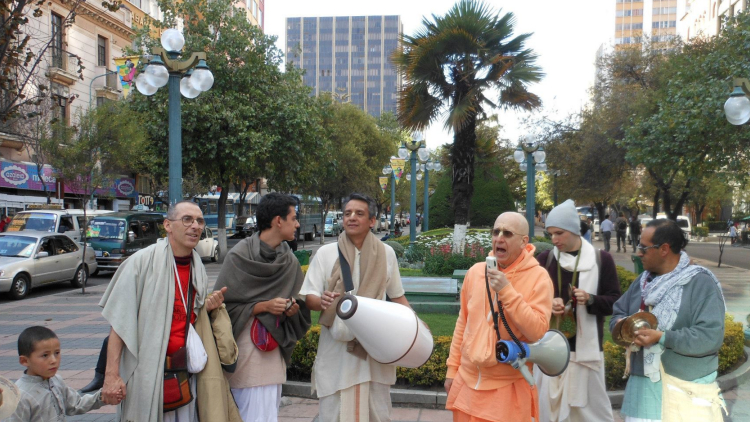Temple Profile: La Paz, Bolivia
By Madhava Smullen | Фев 07, 2014

Name: ISKCON La Paz
Address: Calle Aspiazu 601
Phone: 591-2-72083566, 00591 2275 0567
Website: iskconbolivia.com
Presiding Deities: Sri Sri Gaura Nitai
President: Om Keshavaya Das
Opened on: April 15th, 1997
Temple Style: ISKCON La Paz, more a preaching center than a temple per se, is located in a rented house with a temple room, pujari room, reception area, prasadam room and kitchen.
Расположение: La Paz is a smaller city, Bolivia’s third most populous. ISKCON’s center is located in Sopocachi, a middle-class residential neighborhood.
Known For: The center is best known for its Centro De Estudios Vedicos, which offers educational Bhakti Sastri courses and training courses for new devotees.

A young devotee dances in the Centro De Estudios Vedicos stall at a cultural fair in La Paz
Distinctive food offerings: Typical Gaudiya Vaishnava fare such as subji, rice, and milk sweets are offered to the Deities, as well as some traditional Bolivian dishes. These include charron, made with potatoes, soy, and corn, and Bolivian pizza, topped with palmito (palm hearts).
Number of residents: Although nobody lives at the temple, priests take care of the Deities every day, and there is a regular congregation of around 35 people. Others also come to attend Bhakti Sastri courses.
Number of visitors: Around 50 per week
Best time of year to visit: The city of La Paz is surrounded by the high mountains of the Andean Plateau, and is located at around 3,650 meters (11,975 feet) above sea level, so the weather can be quite cold, especially in the winter. October, when the annual Rathayatra festival is held, and the weather is warmer, is the best time to visit.

Devotees perform at a cultural fair put on by the city of La Paz
Krishna consciousness was first introduced in Bolivia in 1977, but from 1985 onwards, devotees had to work undercover while they were harassed by the country’s constantly changing military regimes.
Finally, on December 18th 2012, ISKCON was given legal recognition by the Bolivian government, now a Democratic Republic. So in a way, Krishna consciousness is really just starting to take off in the country.
There are currently three ISKCON centers in Bolivia: one in Santa Cruz, the most populous city; one in Cochabamba in central Bolivia, and one in La Paz, in the west of the country.
In Santa Cruz, the Govinda’s restaurant is a handsome and popular hangout with the locals.
For its part, the La Paz center’s claim to fame is its Centro De Estudios Vedicos (Center for Vedic Studies). Located within the center, it offers Bhakti Sastri study courses on Srila Prabhupada’s books on Friday evenings, and the more advanced Bhaktivaibhava on Wednesdays.

La Paz devotees gather outside their center with a picture of Srila Prabhupada
“We started offering these courses four years ago,” says ISKCON La Paz president Om Keshavaya Das. “We have connected with Hanumatpresaka Swami, who is leading the Bhakti Sastri and Bhaktivabhava programs in nearby Peru and other countries, and we receive his instructions and study guides.”
Meanwhile, ISKCON La Paz also offers youth programs on Monday evenings, introductory courses on Bhakti yoga for newcomers on Thursdays, and a Saturday “Great Feast” — the equivalent of most ISKCON temples’ Sunday Feast.
ISKCON also works in cooperation with the city of La Paz on various outreach efforts.
Every two months all the local devotees venture out into the city to publicly chant “Harinam,” God’s Holy Names, on the streets.
Every Sunday from April to October, they participate in multicultural fairs put on by the city. Their stall downtown generates a favorable response and distributes many of Srila Prabhupada’s books.

Temple President Om Keshavaya Das with the Mayor of La Paz at the city’s Rathayatra festival
And every October, the Mayor of La Paz invites devotees to include their Ratha Yatra festival in a parade commemorating the anniversary of the city.
“It’s an ecstatic program for us,” says Om Keshavaya. “Many devotees come from all over Bolivia, and sometimes from other countries too.”
The future dream of ISKCON La Paz devotees is to buy land near the city and build a large temple which they hope will improve book distribution efforts and provide a place where young devotees can be trained in Krishna consciousness.
But realizing the dream will be a challenge.
“Today ISKCON in Bolivia has official permission to hold programs, but in La Paz we don’t have the resources to establish a big temple,” Om Keshavaya says. “We are trying to collect money, which is not easy because this is a poor country. But we have faith that one day, it will happen.”















